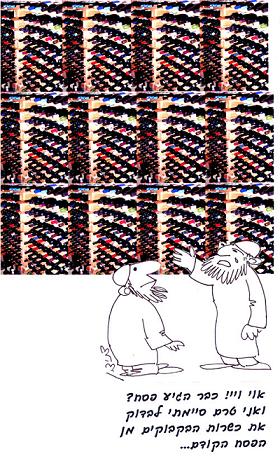
The early sages (Tanaaim) required that one check one’s house for chametz before Passover.
They gave great detail about the places which must be examined and those which are exempt from checking. The guiding rule is “Any place where one does not put chametz during the year need not be checked before Passover.” Thus, for example, the sages discussed whether one must check a wine cellar in which wine barrels are piled one atop another.
The sages ruled that if the wine cellar is in active use and wine for meals is brought from that cellar it must be checked, because it is reasonable to assume that the waiter who goes to bring wine from the cellar for diners will accidentally bring with him a piece of bread and forget it there. One need not check the entire wine cellar, only the first two rows of barrels, for it is reasonable that the waiter will take wine from the first rows, the ones he can easily reach. The sages, though, disagreed about what the first two rows actually are.
According to the study hall of Shammai they are the two rows all along the wine cellar and according to the study hall of Hillel they are the top two rows.
The scholars were divided on interpreting the opinion of the study hall of Shammai.
The scholar Rav Judah explained that they meant a row of barrels to be from the ground to ceiling, so two rows would be the whole front wall of barrels and those directly behind them. The scholar Rabbi Yochanan explained that they meant the entire top row and the entire front wall of barrels must be checked, ground to ceiling.
The scholars were also divided on interpreting the opinion of the study hall of Hillel, “the two external rows are the two top rows.”
According to the scholar Rav, one must check the top row and the row below it, for in his opinion the sages affiliated with Hillel emphasized the external nature of the barrels. According to the scholar Samuel, the two top rows, at the ceiling, must be checked, for in his opinion the sages affiliated with Hillel emphasized the top barrels. (Halacha was ruled in accord with the scholar Samuel.)
(Babylonian Talmud, Tractate Pesachim 8b)
